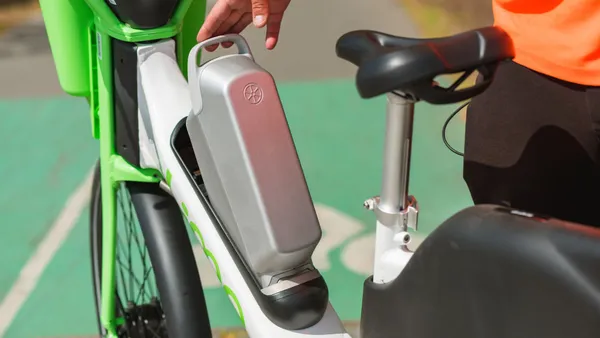UPDATE: July 7, 2021: Colorado Gov. Jared Polis on Tuesday signed HB21-1162 into law, which bans single-use plastic bags at most stores and expanded polystyrene foam (EPS) takeout containers at most restaurants beginning January 1, 2024. Affected retailers will need to start charging a 10-cent bag fee for both paper and plastic bags starting January 1, 2023.
Dive Brief:
- A bill in Colorado banning single-use plastic bags and expanded polystyrene foam (EPS) takeout containers is on its way to the governor’s desk for signature after the Senate approved HB21-1162 on June 8.
- If passed, single-use plastic bags will be banned at most stores, and restaurants will be banned from using polystyrene food service containers starting in 2024. Customers will have to pay 10 cents per paper or plastic bag beginning in 2023 until the ban goes into effect, but retailers will continue charging for paper bags after that date.
- The bill would also make Colorado the first state to repeal its preemption law, a type of policy banning municipalities from creating their own, stricter plastic packaging ordinances by July 2023. Some cities and towns already have bag bans or similar ordinances despite the preemption law, and Denver will require retailers to charge 10 cents per carryout bag starting July 1.
Dive Insight:
Colorado lawmakers have been trying to pass different iterations of the bill for several years, but competing interests from businesses, environmentalists and plastic producers have made it a tough sell, said Rep. Lisa Cutter, a prime sponsor who has been working on the bill since she took office in 2019.
A number of key compromises helped the bill to pass both the House of Representatives and Senate this year, she said. One controversial compromise is that the bill now ends the state’s preemption policy. Colorado is the first state to reverse preemption, environmental groups say, which is notable during a time when nearly 20 states have preemption laws on the books, and several of those states, such as Arkansas and Ohio, enacted those laws within the past year.
Cutter said she is pleased the final bill version ends preemption in the state. Some constituents, especially in Colorado’s smaller mountain towns with less access to recycling infrastructure, told her they wanted to be able to do more to prevent plastic pollution through local packaging bans.
Cutter originally agreed to strike the preemption repeal because retailers told her they worried the change in the law would hurt their budgets as they continued to recover from the pandemic. “It’s been a hard year for small businesses,” she said. The Senate later put the measure back in.
The Colorado Retail Council supported keeping preemption and was "very disappointed to learn that the Senate planned to change the bill back," President Chris Howes told The Denver Post. "If we had known, then we would have simply stayed opposed to the bill for the last two months, instead of working toward an agreement."
Several cities and towns already have bag ban or other plastic packaging restriction ordinances despite the state's preemption, and Cutter said lawmakers drew inspiration from Denver's bag ban when creating the bill. Voters in Fort Collins voted in favor of banning plastic bags starting in May 2022.
Environmental groups and recyclers such as Eco-Cycle threw their support behind the bill, including the provision banning plastic bags from many Colorado establishments starting in January 2024. However, another compromise in the bill limits which businesses are covered by the policy. Small stores, defined as businesses with three or fewer locations, are now exempt from the plastic bag ban, as are pharmacies and dry cleaners.
Businesses that charge customers for plastic or paper bags starting in 2023 will be required to give 60% of the fee revenue to the city where they operate, and those local governments would use the revenue to pay enforcement costs or to fund programs that educate residents about the bag fee or other waste diversion efforts. Businesses would be able to keep the rest, according to the bill.
Colorado’s new law also bans retail food establishments from using EPS containers starting in 2024 and will only be able to use them past that date if they have an excess supply. If passed, Colorado would be the latest state to ban such containers, following New Jersey’s law limiting plastic bags and EPS foam containers last year and Washington’s foam ban signed into law in May. Virginia passed a similar ban in March.
“I anticipate a lot more states will follow in the footsteps of Colorado,” said Hannah Collazo, state director of Environment Colorado, which supports the bill. “Other states are realizing that plastic pollution is an issue to take very seriously, and we will pay the price if we don't slow down plastic production.”
Opponents like the American Chemistry Council have spoken out against such bans, saying the practice is “misguided” and raises costs for small businesses without doing much to prevent plastic pollution. The association, along with other industry groups, backed a separate bill in the Colorado legislature that would have put a small fee on many types of foodservice ware to fund recycling and composting infrastructure and programs.
That bill died last week, but Colazzo said the issue of how to handle and pay for recycling plastics will likely come up again next legislative session, possibly in the form of one or several state extended producer responsibility (EPR) bills. Stakeholders are waiting for the Colorado Department of Public Health and the Environment to come out with a report in July meant to examine how other states are running their EPR programs and offer recommendations for the feasibility of creating a version for the state.














